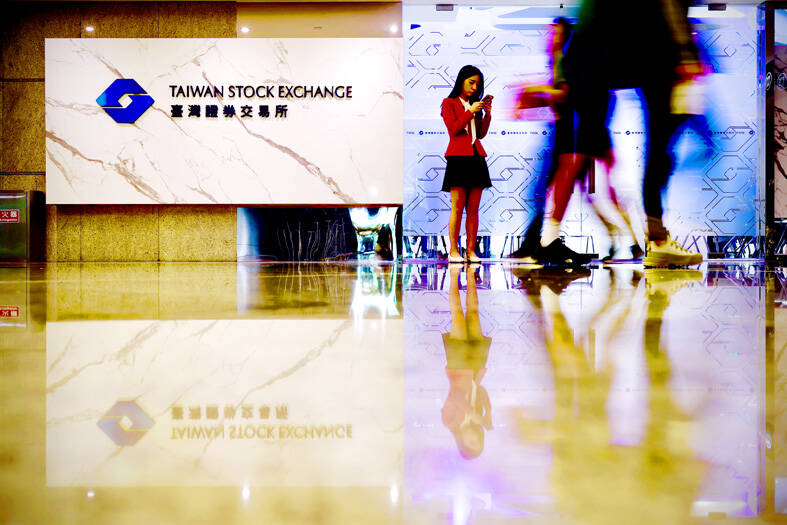The number of retail investors in the local stock market increased in the second quarter of this year compared with the previous quarter, as Taiwanese stocks rebounded in a roller-coaster quarter.
Amid US President Donald Trump’s announcement of new tariffs in April and the New Taiwan dollar’s sharp appreciation against the US dollar the following month, the TAIEX dropped to as low as 17,306 points, before quickly rebounding to more than 20,000 points in a couple of sessions.
Overall, the TAIEX surged 1,560.12 points, or 7.53 percent, in the April-to-June quarter after the activation of the NT$500 billion (US$17.06 billion) National Stabilization Fund (國安基金) and on the back of several listed firms’ strong corporate earnings, Taiwan Stock Exchange (TWSE) data showed.

Photo: Ritchie B. Tongo, EPA-EFE
On Monday, the Ministry of Finance said in a statement that the fund invested more than NT$7.7 billion to support local shares between April 9 and June 30.
The greater stock market volatility did not dampen investor sentiment in the second quarter, as the latest data released on Monday by the TWSE showed that the number of retail investors with quarterly trading of less than NT$100 million increased by 26,795 from the previous quarter to 5.26 million, the second-highest on record.
The highest number of small retail investors, 5.52 million, was recorded in the third quarter of last year, TWSE data showed.
In addition, the number of retail investors with quarterly turnover of NT$100 million to NT$500 million increased 1,166 to 23,214, while those with minimum quarterly trading of NT$500 million also added 41 to 2,663 in the second quarter, both ending three consecutive quarters of decline, the exchange said in a statement.
However, the number of “small players,” “mid-sized players” and “big players” fell from the same period last year when the market was on a bull run, down 31,518, 13,070 and 1,502 people respectively, TWSE data showed.
In the second quarter, retail investors accounted for 48.94 percent of the market’s overall turnover of NT$20.65 trillion, down from 50.8 percent in the first quarter, while foreign institutional investors made up 37.29 percent, up from 36.21 percent.
Local institutional investors represented the remaining 13.77 percent, also up from 12.99 percent the previous quarter, the exchange said.
The TAIEX yesterday closed 0.98 percent higher at 22,835.94. The index was still down 0.86 percent this year, exchange data showed.

Sweeping policy changes under US Secretary of Health and Human Services Robert F. Kennedy Jr are having a chilling effect on vaccine makers as anti-vaccine rhetoric has turned into concrete changes in inoculation schedules and recommendations, investors and executives said. The administration of US President Donald Trump has in the past year upended vaccine recommendations, with the country last month ending its longstanding guidance that all children receive inoculations against flu, hepatitis A and other diseases. The unprecedented changes have led to diminished vaccine usage, hurt the investment case for some biotechs, and created a drag that would likely dent revenues and

Global semiconductor stocks advanced yesterday, as comments by Nvidia Corp chief executive officer Jensen Huang (黃仁勳) at Davos, Switzerland, helped reinforce investor enthusiasm for artificial intelligence (AI). Samsung Electronics Co gained as much as 5 percent to an all-time high, helping drive South Korea’s benchmark KOSPI above 5,000 for the first time. That came after the Philadelphia Semiconductor Index rose more than 3 percent to a fresh record on Wednesday, with a boost from Nvidia. The gains came amid broad risk-on trade after US President Donald Trump withdrew his threat of tariffs on some European nations over backing for Greenland. Huang further

Nvidia Corp’s GB300 platform is expected to account for 70 to 80 percent of global artificial intelligence (AI) server rack shipments this year, while adoption of its next-generation Vera Rubin 200 platform is to gradually gain momentum after the third quarter of the year, TrendForce Corp (集邦科技) said. Servers based on Nvidia’s GB300 chips entered mass production last quarter and they are expected to become the mainstay models for Taiwanese server manufacturers this year, Trendforce analyst Frank Kung (龔明德) said in an interview. This year is expected to be a breakout year for AI servers based on a variety of chips, as

HSBC Bank Taiwan Ltd (匯豐台灣商銀) and the Taiwan High Prosecutors Office recently signed a memorandum of understanding (MOU) to enhance cooperation on the suspicious transaction analysis mechanism. This landmark agreement makes HSBC the first foreign bank in Taiwan to establish such a partnership with the High Prosecutors Office, underscoring its commitment to active anti-fraud initiatives, financial inclusion, and the “Treating Customers Fairly” principle. Through this deep public-private collaboration, both parties aim to co-create a secure financial ecosystem via early warning detection and precise fraud prevention technologies. At the signing ceremony, HSBC Taiwan CEO and head of banking Adam Chen (陳志堅)